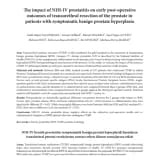Advancements in Medical Technology: Robotic Surgery for Prostate Cancer

Introduction
Prostate cancer is one of the most prevalent forms of cancer in men, affecting millions worldwide. While traditional treatment options such as radiation therapy and open surgery have long been the standard of care, the field of medicine has witnessed a transformative breakthrough in recent years: robotic surgery for prostate cancer. This cutting-edge technology has revolutionized the way doctors diagnose and treat this disease, offering patients a minimally invasive and highly precise alternative. In this article, we will explore the evolution of robotic surgery for prostate cancer and its impact on patient outcomes.
The Emergence of Robotic Surgery
Robotic surgery for prostate cancer emerged in the early 2000s, when the da Vinci Surgical System was first introduced. Developed by Intuitive Surgical Inc., the da Vinci system represents a significant leap in medical technology, enabling surgeons to perform intricate procedures with enhanced precision and dexterity. This minimally invasive approach involves a surgeon operating a console with a 3D view of the patient's anatomy and robotic arms that mimic their hand movements with unparalleled accuracy.
The Benefits of Robotic Surgery
-
Enhanced Precision: One of the primary advantages of robotic surgery for prostate cancer is the incredible precision it offers. The high-definition 3D visuals and precise instruments allow surgeons to navigate intricate anatomical structures with minimal disruption to surrounding tissues. This precision translates to reduced trauma, less blood loss, and faster recovery times for patients.
-
Minimally Invasive: Traditional open surgeries for prostate cancer involve large incisions and lengthy recovery periods. In contrast, robotic surgery uses small incisions, resulting in less pain, reduced scarring, and a quicker return to daily activities. Patients typically spend less time in the hospital, leading to an improved overall experience.
-
Improved Outcomes: Studies have shown that robotic surgery can lead to improved surgical outcomes compared to traditional methods. Patients often experience fewer complications, reduced risk of infection, and a lower chance of needing a blood transfusion. The advanced technology also allows for better preservation of erectile and urinary function, crucial aspects of a patient's quality of life after surgery.
-
Quicker Recovery: The minimally invasive nature of robotic surgery results in shorter hospital stays and a quicker return to normal activities. Patients can typically resume their daily routines and return to work sooner, minimizing the disruption to their lives.
-
Reduced Side Effects: Robotic surgery can significantly reduce the risk of incontinence and erectile dysfunction, which are common side effects of prostate cancer surgery. The precision of the robotic system allows surgeons to spare nerves and minimize damage to surrounding tissues, preserving these essential functions.
Patient Experience and Future Prospects
The patient experience is a vital aspect of any medical procedure, and robotic surgery for prostate cancer offers several advantages in this regard. Patients often report less pain and discomfort, shorter hospital stays, and a faster return to normalcy. This translates to improved overall well-being and satisfaction with their treatment.
Looking ahead, the field of robotic surgery continues to evolve. Researchers and engineers are continually working on refining the technology, making it even more precise and versatile. The potential for telemedicine applications, where experienced surgeons can perform procedures remotely using robotic systems, holds promise for improving access to care in underserved areas.
Conclusion
Robotic surgery for prostate cancer has emerged as a game-changer in the field of oncology. Its benefits in terms of precision, minimally invasive nature, improved outcomes, and patient experience have made it a preferred choice for many patients and surgeons alike. As technology continues to advance, we can expect even more remarkable developments in the field of robotic surgery, offering hope to countless individuals battling prostate cancer and other complex medical conditions. While it is essential to acknowledge that not all patients are candidates for robotic surgery, its availability as a treatment option represents a significant step forward in the fight against prostate cancer.




